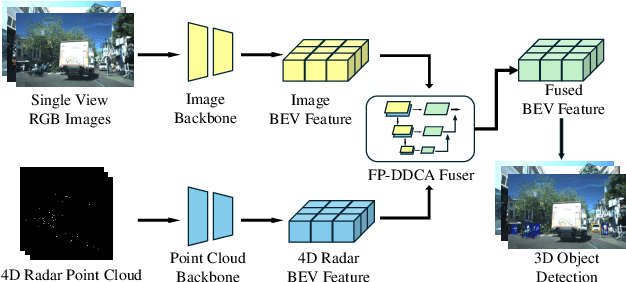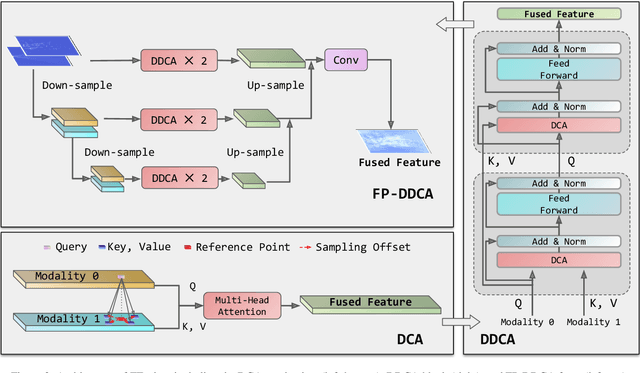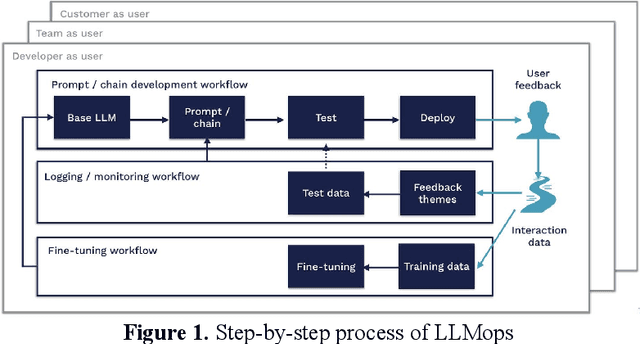Tong Zhan
ZFusion: An Effective Fuser of Camera and 4D Radar for 3D Object Perception in Autonomous Driving
Apr 07, 2025



Abstract:Reliable 3D object perception is essential in autonomous driving. Owing to its sensing capabilities in all weather conditions, 4D radar has recently received much attention. However, compared to LiDAR, 4D radar provides much sparser point cloud. In this paper, we propose a 3D object detection method, termed ZFusion, which fuses 4D radar and vision modality. As the core of ZFusion, our proposed FP-DDCA (Feature Pyramid-Double Deformable Cross Attention) fuser complements the (sparse) radar information and (dense) vision information, effectively. Specifically, with a feature-pyramid structure, the FP-DDCA fuser packs Transformer blocks to interactively fuse multi-modal features at different scales, thus enhancing perception accuracy. In addition, we utilize the Depth-Context-Split view transformation module due to the physical properties of 4D radar. Considering that 4D radar has a much lower cost than LiDAR, ZFusion is an attractive alternative to LiDAR-based methods. In typical traffic scenarios like the VoD (View-of-Delft) dataset, experiments show that with reasonable inference speed, ZFusion achieved the state-of-the-art mAP (mean average precision) in the region of interest, while having competitive mAP in the entire area compared to the baseline methods, which demonstrates performance close to LiDAR and greatly outperforms those camera-only methods.
Optimization Techniques for Sentiment Analysis Based on LLM (GPT-3)
May 16, 2024



Abstract:With the rapid development of natural language processing (NLP) technology, large-scale pre-trained language models such as GPT-3 have become a popular research object in NLP field. This paper aims to explore sentiment analysis optimization techniques based on large pre-trained language models such as GPT-3 to improve model performance and effect and further promote the development of natural language processing (NLP). By introducing the importance of sentiment analysis and the limitations of traditional methods, GPT-3 and Fine-tuning techniques are introduced in this paper, and their applications in sentiment analysis are explained in detail. The experimental results show that the Fine-tuning technique can optimize GPT-3 model and obtain good performance in sentiment analysis task. This study provides an important reference for future sentiment analysis using large-scale language models.
Maximizing User Experience with LLMOps-Driven Personalized Recommendation Systems
Apr 01, 2024
Abstract:The integration of LLMOps into personalized recommendation systems marks a significant advancement in managing LLM-driven applications. This innovation presents both opportunities and challenges for enterprises, requiring specialized teams to navigate the complexity of engineering technology while prioritizing data security and model interpretability. By leveraging LLMOps, enterprises can enhance the efficiency and reliability of large-scale machine learning models, driving personalized recommendations aligned with user preferences. Despite ethical considerations, LLMOps is poised for widespread adoption, promising more efficient and secure machine learning services that elevate user experience and shape the future of personalized recommendation systems.
Research on the Application of Deep Learning-based BERT Model in Sentiment Analysis
Mar 13, 2024



Abstract:This paper explores the application of deep learning techniques, particularly focusing on BERT models, in sentiment analysis. It begins by introducing the fundamental concept of sentiment analysis and how deep learning methods are utilized in this domain. Subsequently, it delves into the architecture and characteristics of BERT models. Through detailed explanation, it elucidates the application effects and optimization strategies of BERT models in sentiment analysis, supported by experimental validation. The experimental findings indicate that BERT models exhibit robust performance in sentiment analysis tasks, with notable enhancements post fine-tuning. Lastly, the paper concludes by summarizing the potential applications of BERT models in sentiment analysis and suggests directions for future research and practical implementations.
 Add to Chrome
Add to Chrome Add to Firefox
Add to Firefox Add to Edge
Add to Edge